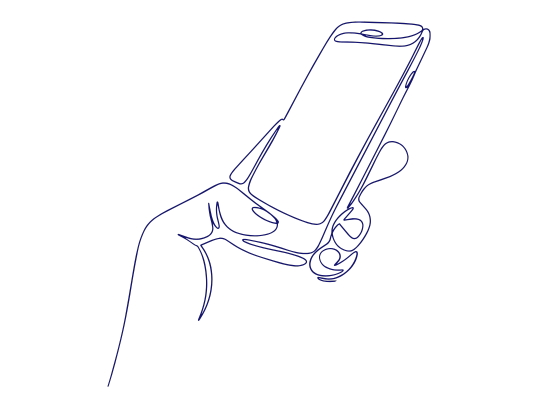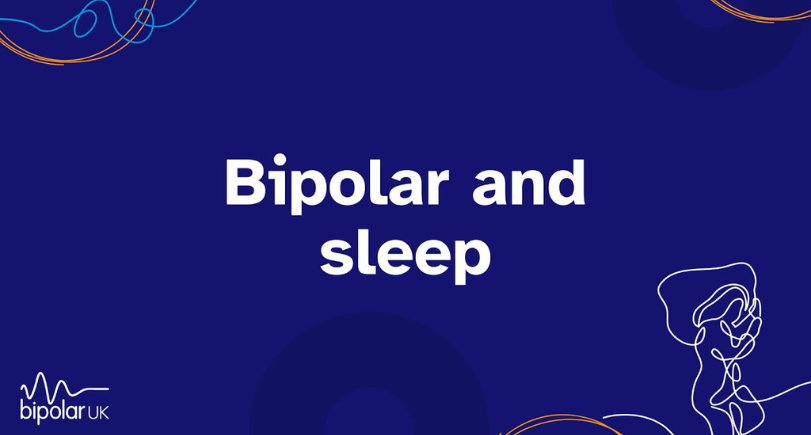
Bipolar and sleep
Sleep and bipolar are closely connected. If you live with bipolar, getting good quality sleep is one of your key protective factors.
5 things you need to know about bipolar and sleep
- Lack of regular quality sleep is a common trigger for mood episodes – 80% of 2000 people who took part in a Bipolar UK survey said it’s the biggest trigger for a first episode of bipolar, or relapse.
- Disturbed sleep patterns can be an early warning sign of a bipolar mood episode.
- Sleeping too much or too little are common symptoms of depression.
- Not needing any or not getting enough sleep are common symptoms of hypomania and mania.
- Research shows there are lots of things you can do to help your body produce ‘wake-up’ chemicals in the morning and ‘go to sleep’ chemicals at night, which will improve the quality of your sleep.
Track your sleep
Our award-winning Mood Tracker app allows you to record your daily mood, medications, emotions and how much sleep you’ve had.
Using the app daily means you can record any symptoms and notice any early signs of an episode.

The science of sleep
Sleep pressure
This is the pressure to go to sleep, that grows stronger the longer we are awake (also known as sleep homeostasis). It generally reaches a tipping point at about our usual bedtime when levels of the ‘tiredness’ neurotransmitter adenosine reach their peak. If you go to bed and to sleep, the pressure re-sets for the next day. This process is linked to your body clock, or circadian rhythm.
Circadian rhythm
This is the ‘body clock’ that drives how tired or awake you feel, and many of your body’s functions including thirst, appetite, sex drive and more. This process is linked to daylight, and to melatonin (the ‘fall asleep’ chemical). Light stops your body making melatonin, and darkness increases it. Melatonin helps you sleep at night if you get the feeling of tiredness from sleep pressure at the right time.
What causes sleep problems in people with bipolar?
There are a few reasons why people with bipolar disorder might find it hard to get regular, good quality sleep, including:
- Genes – research suggests that people with bipolar are more sensitive to things that disrupt the brain’s internal body clock. For example, one theory is that some people with bipolar are more sensitive to the effects of light.
- An irregular routine – eating times, waking times, socialising and physical activity times all affect your body clock.
- Anxiety (more likely in women with bipolar) can create higher levels of stress and arousal in the body that make it harder to get to sleep. Feelings of worry and panic before bed can also cause vivid dreams that interrupt sleep.
- Post-traumatic stress disorder (PTSD) – where someone’s having intrusive thoughts and/or feeling emotionally numb about difficult past events – can commonly cause nightmares and is linked to insomnia and sleep disruption.
- Obesity is linked with increased daytime sleepiness even in people who sleep through the night, affecting sleep-wake cycles and sleep quality. This is due to the increased risk of indigestion, night-time asthma symptoms, and obstructive sleep apnoea – a sleep disorder that causes loud snoring and breathing issues.
- Addiction to substances can interfere with sleep including:
- caffeine – chocolate, coffee, cola and energy drinks contain caffeine, which is a stimulant that leads to increased alertness and delayed sleepiness.
- alcohol – drinking alcohol before bed means you’re more likely to wake up a lot and get low-quality sleep, leading to long-term sleep problems.
- nicotine – people living with bipolar are two to three times more likely to smoke, which disrupts sleep because nicotine is a stimulant. In fact, smokers are 50% more likely to have sleep problems. Vapes contain nicotine and have the same effect.
- recreational drugs disturb sleep in different ways. For example, cannabis with high levels of active ingredient causes sleep disturbance; morphine and opioids prevent you getting deep sleep; cocaine can lead to insomnia; and ecstasy (MDMA) prevents you falling asleep and getting good quality sleep.

In this webinar, sleep expert and Emeritus Professor Kevin Morgan explores how sleep disturbance can be a symptom of bipolar.
10 ways to get better sleep when you live with bipolar
1. Get into a routine
- Set a regular time to go to sleep at night and to wake up in the morning. Stick to this routine at weekends and on holidays as much as you can.
- If you’re not in a routine at the moment, don’t change everything at once. Instead, adjust your sleep and wake times by no more than an hour or less each day until you get to the timings that help you manage work, university and any other commitments.
- When you have a late night, early morning or you sleep in later than planned, just get back into the routine again the next day.
- If you are able to, avoid night shifts or flying through different time zones where there is a significant time difference too often.
2. Use daylight to help
- Getting out in the sun in the morning – even in winter, or on a cloudy day – can help regulate your circadian rhythm to support more stable sleep and mood patterns.
- If you can’t get outside, some people with bipolar find light therapy can help to manage sleep patterns. This involves sitting next to a light box (10,000 lux, UV-filtered) for 10 to 30 minutes each morning, ideally as soon after waking up as possible, at the same time each day.
- Light therapy does need careful managing however, as overuse can trigger hypomania or mania. The key is to start with very short sessions (two minutes). Then gradually increase the time, carefully monitoring for any signs of high mood with your GP or psychiatrist.
3. Avoid blue light
- Blue light (a type of artificial light given out by digital devices and lighting) interferes with your body clock and can stop you getting good quality sleep. Some research suggests that people living with bipolar may be particularly sensitive to its effects.
- It can be a tricky habit to break, but limit your use of digital devices like TVs, tablets, phones, computers, video games and e-readers an hour before bed.
- Switch off fluorescent or LED lights. Use a bedside lamp that gives out amber or yellow light instead.
- If you use a device during the hour before bed, use blue light blocking glasses or a screen filter. If you can, switch to ‘night mode’, which reduces some of the blue light. And dim the brightness of the screen.
- Wear an eye mask to sleep – especially if you have light sources in the room, such as a digital alarm clock or a streetlamp outside the window.
4. Plan your mealtimes
- When you eat affects your circadian rhythm, so try to eat breakfast as soon as you wake up and avoid late evening meals and snacking if you can, especially sleep-disrupting substances in the evenings, such as chocolate, alcohol, nicotine and recreational drugs.
- Once you get into a routine that works for you, stick to it as much as you can.
5. Plan your exercise times
- Planning your exercise times will help to get your circadian rhythms into a routine to help support your sleep pattern.
- Don’t exercise in the late afternoon or evening as your nervous system will then be in an aroused state, making it harder to fall asleep. Try exercising in the morning if you want to go to sleep earlier.
6. Avoid naps
- If you’re finding it hard to sleep at bedtime, don’t nap at all.
- If you do need to nap during the day, the earlier in the day you sleep the better – and the ideal length of a daytime nap is between 10 and 20 minutes. Any longer, and you’ll wake up feeling sluggish and your night-time sleep pattern will be disrupted.
7. Wind down before bedtime
- To help switch your nervous system into a more relaxed state so you’re ready for sleep, it's worth trying all the usual relaxation tips, such as listening to soft relaxing music, having a warm bath or reading a good book.
- If you're feeling stressed, learn more about bipolar and stress - and try a simple stress-busting technique to reduce the stress hormone cortisol in your body.
- Listen to a guided meditation for sleep, such as the NHS Beditation to lower your heart and breathing rates.
8. Get up after 15 minutes if you can't sleep
- If you can't sleep after 15 minutes in bed, get up and do something gentle and relaxing. For example, in dim lighting, walk slowly around the room, stretch or read for five minutes, then go back to bed.
- Get up again after another 15 minutes if you still can’t sleep.
- Even if you get to sleep later than planned, it's important to get up at your regular time the next morning to help you drop off quicker the following day.
9. Ask your doctor about night sedation
- If your sleep problems go on for more than a few days, speak to your doctor about night sedation. However, it’s important to remember that medication is a short-term option, not a long-term solution.
- Sleeping tablets can be addictive, can stop working with frequent use, can have side-effects and can interact with other medication.
Read more about medication for bipolar
10. Talk things through
If you're struggling with your sleep, you're not alone. Speak to someone who really understands by booking a call with our friendly support team who are here for anyone who’s affected by bipolar to offer support, advice and information.

